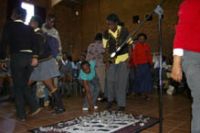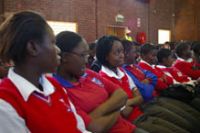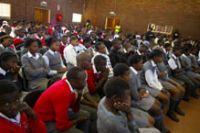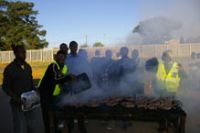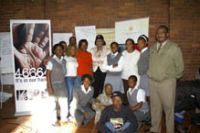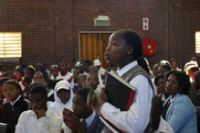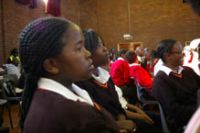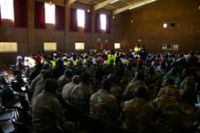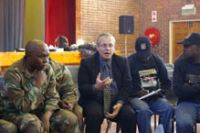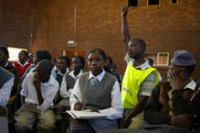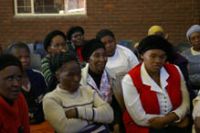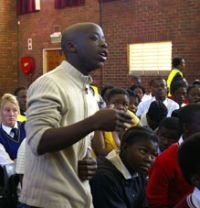
July 1, 2008 – The NMF Centre of Memory and Dialogue’s second community conversation on HIV prevention took place in Mhluzi on June 3, 2008. This series of 11 conversations continues work that was started in 2007, providing communities with the opportunity to talk about and tackle the epidemic.
About Mhluzi
Mhluzi is a relatively affluent township with 182 000 residents, adjacent to Middelburg in the Steve Tshwete Municipality, Mpumalanga. The province has a diverse economy built around timber, coal mining, agriculture, tourism and oil, but unemployment is evident too.
The Community Conversation coincided with the monthly queue for government grants, which made it clear that many citizens, young and old, depend on this source of income.
The people of Mhluzi speak and understand many languages, including isiNdebele, siSwati, isiZulu, seTswana and sePedi. Their stated values of tolerance and compassion, however, are being strained by a new culture of substance abuse.
The meeting
The Community Conversation on June 3 in the Eric Jiyane Community Hall lasted for two and a half hours. The main facilitator was Cool Ideas’ Motlatsi Lekhuleni. He guided the “counting your losses” and storytelling sessions and helped the community set the way forward. Musa Lukhele helped those present to understand the purpose and vision of the event. Mbali Duze facilitated the process of the community laying down its own ground rules. Ellington Twala broke the ice by introducing participants. Three break-away groups were formed so that youth, men and women could talk among themselves.
About 660 community members attended the meeting: 410 young people (150 male and 260 female) and 250 older people (110 male and 140 female). Of the men, 40 were members of the South African National Defence Force.
People from other, less affluent townships in the area, such as Hendrina, Doornkop, Naledi Village, Makalane, Pullen’s Hope and Rietkuil, could not attend because of transport difficulties.
Preparing the ground
The community conversations use a methodology called the Community Capacity Enhancement Programme. The idea is to encourage community members to identify the issues they need to tackle and then to bring about change together.
On November 15, 2007, the Nelson Mandela Foundation held a dialogue at St Peter’s Lutheran Church in Mhluzi, where young people aged between 16 and 24 identified certain issues as having a bearing on the spread of HIV in their community. These issues included peer pressure, aspiring to a “bling” lifestyle, “sugar daddies” preying on vulnerable girls, and stigma. The participants also realised they needed to form partnerships with local structures to support their activities in fighting the spread of HIV.
This year, these young people returned to the discussion with their parents and grandparents. The facilitators used the “counting your losses” and storytelling tools to create a place where individuals could express themselves without fear.
Tools for talking
As described in the report on the Lerome conversation, those present were asked to think of the people they had lost to AIDS and to find small stones to represent those lives and place them on a memorial cloth. They then shared their feelings and it became evident how much the community needed to mend and acknowledge the need to bring about change.
The other tool used was storytelling. When people are given a chance to tell stories, they find their own words for their experiences and often have insights which can be the basis for change.
Facilitators create the beginning of a story: two families in the community have children who are planning to get married. But then the young woman is diagnosed as HIV-positive… It’s left to the listeners to imagine how the story could unfold and to put themselves in the shoes of the characters. This leads to robust dialogue.
The community is then segmented by age and gender, with due regard to social and cultural dynamics, to create appropriate groups where people can express themselves freely and comfortably. They talk about the same questions that were raised in the plenary session and then nominate representatives for a team that will carry forward the community’s plans.
How it worked in Mhluzi
The large number of people present made it difficult to follow all the steps in this methodology and to manage the time available. In the youth and men’s groups, there was also a need to translate for the benefit of some English-speakers. However, because the facilitators paraphrase what has been said anyway, they could use the opportunity to translate too. Some of the men were shy about not being able to speak English, but the facilitators encouraged everyone to use their own language.
Contributing to the event’s success were the teamwork and co-ordination between event organisers and local structures, plenty of pre-publicity, and a media and arts event held at a local school the previous day.
Burning issues
The storytelling process reveals where the community stands on certain questions that arise. It became clear that the people of Mhluzi generally held the values of tolerance and compassion, which they wanted to apply in the area of HIV/AIDS. They were particularly worried about substance abuse. A small number of people, however, said that if placed in the position described in the story, they would cancel the wedding, move out of the house or even kill the HIV-positive bride.
Poverty was identified as the source of most of the temptations and challenges faced by the local youth. This gave rise to sexual relationships between generations.
The number of liquor outlets and their proximity to other shops was a concern. It was felt that children were not safe going to the shops.
Small children were seen playing in the street, supervised only by other very young children.
Agreements reached
The community groups elected a committee consisting of one woman, one man and two youth, who were joined by a representative of the local government’s youth desk. Their commitment – recorded on a public mural – was to look into whether local people affected by HIV and AIDS were being cared for properly, and to make a list of which organisations could assist.
Images from the event
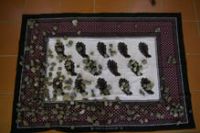
Stones representing lives lost to AIDS.
(Image: Nelson Mandela Foundation)